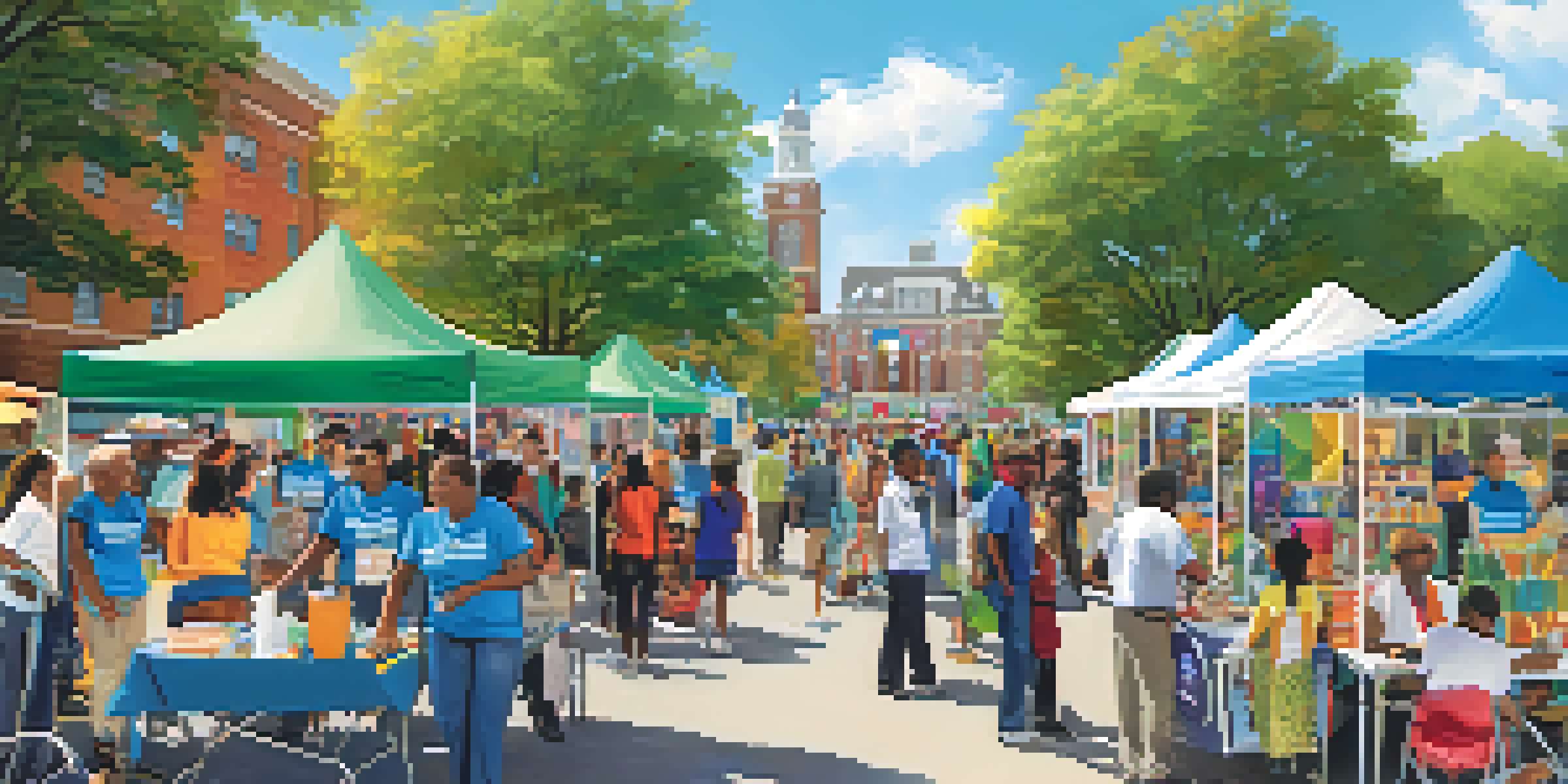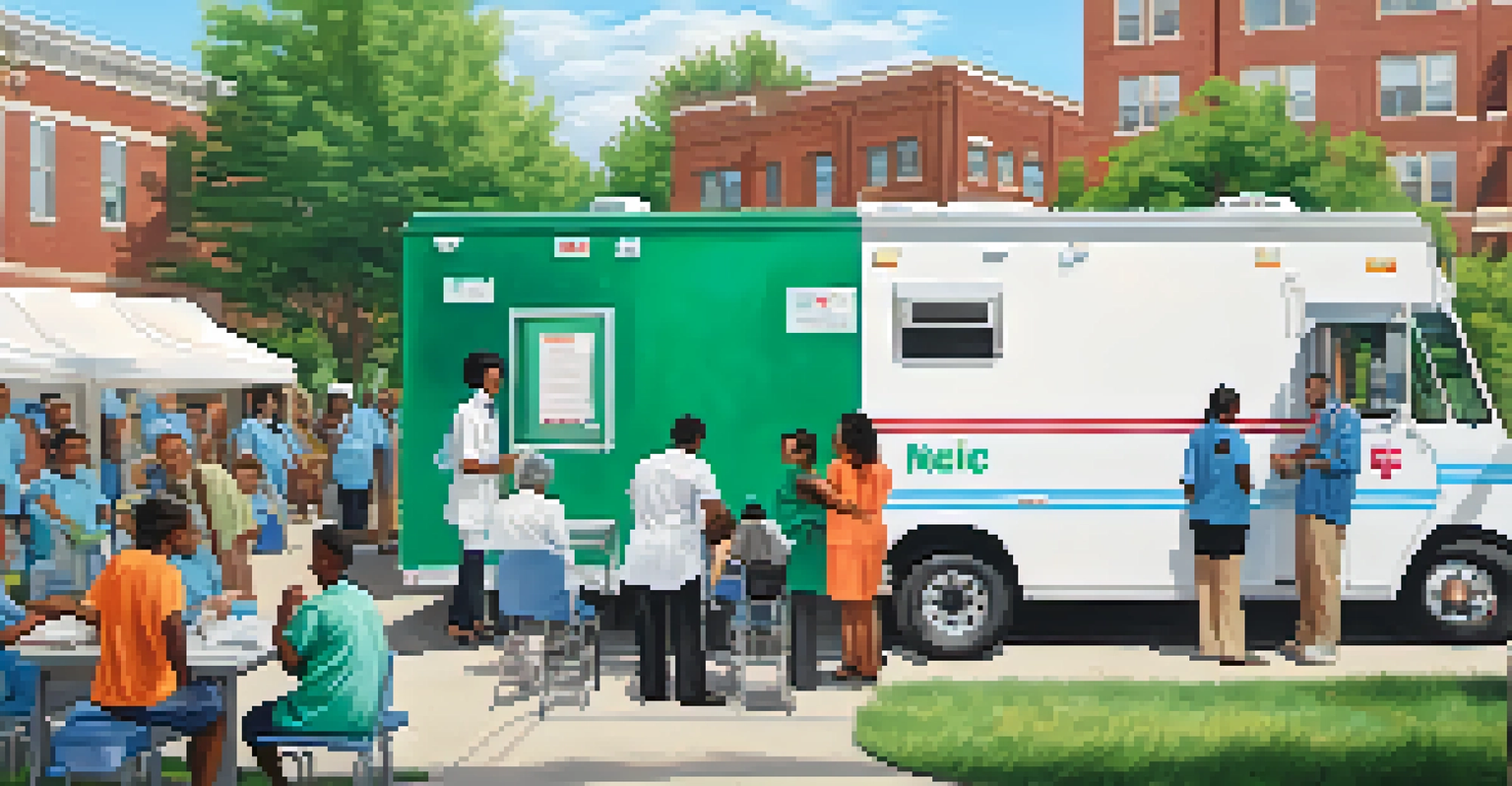Access to Healthcare: Newark's Community Services Overview

The Importance of Accessible Healthcare in Newark
Access to healthcare is crucial for the well-being of any community, and Newark is no exception. It influences everything from individual health outcomes to overall public health. When people can easily reach medical services, they are more likely to seek preventive care, manage chronic conditions, and reduce emergency room visits.
Health is a state of complete physical, mental, and social well-being and not merely the absence of disease or infirmity.
Newark faces unique challenges, including socioeconomic disparities and a diverse population that requires tailored healthcare solutions. Understanding these challenges helps in creating effective community services that cater to everyone. By addressing barriers to access, Newark can improve health outcomes for its residents.
Moreover, accessible healthcare fosters a sense of community and support. When individuals receive the care they need, they are more likely to engage in their neighborhoods, leading to healthier, more vibrant communities. This holistic approach to health can transform Newark into a model for accessible healthcare.
Key Community Health Services Available in Newark
Newark boasts several community health services designed to meet the needs of its residents. These include clinics that focus on preventive care, mental health services, and substance abuse programs. Each service plays a vital role in ensuring that everyone has access to the care they need.

For instance, the Newark Community Health Center provides comprehensive healthcare, including primary care, dental services, and behavioral health support. Such centers are essential for those who might be uninsured or underinsured, offering affordable care options and sliding scale fees based on income.
Healthcare Access Boosts Community Health
Improving access to healthcare services in Newark can enhance individual health outcomes and promote overall community well-being.
Additionally, mobile health units are becoming increasingly popular in Newark, bringing healthcare directly to underserved areas. These units offer vaccinations, screenings, and health education, ensuring that even the most remote communities have access to vital health services.
Mental Health Services: A Critical Component
Mental health is an integral part of overall health, yet it often receives less attention than physical health. In Newark, various organizations focus on mental health services to address this gap. These services range from counseling to crisis intervention, tailored to meet the diverse needs of the community.
The greatest weapon against stress is our ability to choose one thought over another.
Programs like the Newark Mental Health Coalition offer resources and support for individuals facing mental health challenges. They work on reducing the stigma associated with seeking help, encouraging people to prioritize their mental well-being. By promoting mental health awareness, Newark is taking significant steps toward holistic health care.
Moreover, partnerships between schools and mental health professionals are emerging, providing students with much-needed support. This proactive approach ensures that mental health care is accessible to younger generations, setting the stage for healthier futures.
Addressing Substance Abuse through Community Programs
Substance abuse is a significant issue that affects many communities, including Newark. To combat this, local organizations have developed programs aimed at prevention, treatment, and recovery support. These initiatives are crucial for helping individuals regain control of their lives and reintegrate into society.
For example, the Newark Recovery Center provides a safe space for individuals in recovery, offering counseling, support groups, and life skills training. Such centers not only help those struggling with addiction but also foster a supportive community environment that encourages healing and growth.
Mental Health Services Are Vital
Addressing mental health needs through dedicated programs is crucial for creating a holistic healthcare environment in Newark.
Additionally, harm reduction strategies are being implemented to minimize the negative consequences of substance abuse. These strategies include needle exchange programs and overdose prevention education, which play a vital role in improving public health and safety.
Health Education: Empowering Newark Residents
Health education is a cornerstone of accessible healthcare, empowering residents to make informed decisions about their health. In Newark, various community organizations provide workshops and resources that teach individuals about nutrition, preventive care, and chronic disease management. This knowledge is essential for fostering a healthier population.
One notable initiative is the Newark Health Education Initiative, which offers free classes on topics such as healthy cooking, exercise, and managing diabetes. These programs not only educate but also create a sense of community as residents come together to learn and support one another.
By prioritizing health education, Newark is equipping its residents with the tools they need to lead healthier lives. This proactive approach has the potential to reduce healthcare costs and improve overall community health outcomes.
Collaboration Between Community Organizations
Collaboration among community organizations is essential for enhancing healthcare access in Newark. By working together, these organizations can share resources, knowledge, and best practices, creating a more cohesive network of support for residents. This teamwork is vital for addressing complex health issues that require multifaceted solutions.
For instance, partnerships between hospitals, clinics, and non-profit organizations have led to the development of comprehensive care models. These models ensure that patients receive not only medical care but also social support, such as housing assistance and job training, which are crucial for their overall well-being.
Collaboration Enhances Healthcare Delivery
Partnerships among community organizations are essential for providing comprehensive healthcare solutions and addressing complex health issues.
Moreover, community forums and health fairs are often organized to bring various stakeholders together. These events not only provide valuable health services but also foster relationships between residents and the organizations that serve them, creating a more connected community.
Future Directions for Healthcare Access in Newark
Looking ahead, Newark has the opportunity to further improve healthcare access through innovative solutions and community engagement. One potential direction is the expansion of telehealth services, which can reach individuals who might struggle to visit clinics in person. This technology can bridge gaps and provide care to those in remote areas or with mobility challenges.
Additionally, ongoing efforts to secure funding for community health programs will be crucial. By investing in these initiatives, Newark can enhance services and ensure that they remain accessible to all residents, regardless of their socioeconomic status.

Finally, continued advocacy for policies that promote health equity will be essential. As Newark strives to create a healthcare system that serves everyone, engaging residents in the decision-making process will ensure that their voices are heard and their needs are met.